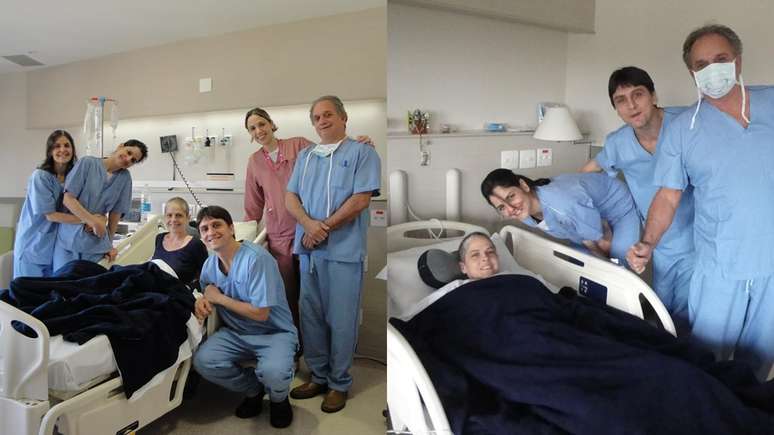In the midst of the floods that hit Rio Grande do Sul, psychiatrist Dr. Jéssica Martani talks about the consequences of trauma on mental health
Suffering serious trauma leaves emotional scars that can hurt our soul. I would like to talk to you about Post-Traumatic Stress Disorder, PTSD, formerly called “traumatic war neurosis”. As time passed, scholars began to realize that this disorder did not only occur in people who participated in war, which is why, in 1980, the disorder was renamed.
The truth is that we are not protected from extremely negative events. Exposure to violence, disasters, and catastrophes can happen and leave an emotional wreck.
The events that happened in Rio Grande do Sul are devastating and people exposed to such situations can develop what we call entity trauma compared to post-war situations, which, if not well processed, can turn into post-war stress disorders.
What is post-traumatic stress disorder?
Post-traumatic stress disorder (PTSD) is a complex condition that occurs after traumatic experiences. This disorder is characterized by intrusive memories of events. It is as if the film in our mind is flawed and does not leave the worst scene, which is repeated intensely and relentlessly in the last volume.
Memories are invasive, they repeat themselves and destroy mental health. In common situations, such as working or being with family, the mind is invaded by a terrifying shadow of memories of what happened. Nightmares and flashbacks cause our body to react and experience feelings of fear, helplessness, horror and guilt which, manifesting themselves continuously, can lead us to anguish and anxiety.
Generally, such traumatic events are direct experiences, experienced in different ways. PTSD affects both the victims of a situation and the people they tried to help, for example, such as police officers, doctors, firefighters, rescue teams, etc.
Check out this photo on Instagram
A post shared by Jessica Martani Psychiatrist (@dra.jessicamartani)
Are indirect situations also triggers?
But it is not only individuals who directly experienced the event who may suffer from the disorder. Vicarious experiences can also cause PTSD in susceptible people, for example, in someone who knows someone who has experienced trauma. Seeing shocking images on television can also be devastating to our minds, as we are empathetic beings and it is normal for us to put ourselves in someone else’s shoes, feeling the pain as if it were happening to us.
The body cannot separate the real from the virtual. Therefore, continuous exposure to this type of news is not recommended, especially for people who already suffer from psychiatric conditions, such as anxiety, depression, personality disorders, among others. So if you’re sensitive, update, but don’t delve too deeply into this type of content.
When we talk about indirect exposure, most of the people involved will recover. Typically, acute stress disorder occurs and has a resolution, however, if symptoms persist for more than a month, we may consider the diagnosis of post-traumatic stress disorder.
Signs of post-traumatic stress disorder
The symptoms of Post-Traumatic Stress Disorder are varied and grouped into four main categories:
1. Intrusions of thoughts: repetitive and unwanted thoughts about what happened, as well as flashbacks and nightmares. The person cannot control their mind, which becomes a toxic environment;
2. Dodge: It is very common for people to avoid talking about the topic in any way or to avoid everything that relates to the event, such as places, people and situations related to the trauma;
3. Hyperreactivity: It is common for a person to be in a constant state of alert, frightened by small triggers, irritable with outbursts of fury disproportionate to the events, which may be followed by physical symptoms such as, for example, tachycardia, shortness of breath, tremors, among others . Bouts of unbridled crying may also occur, as well as self-destructive behavior;
4. Mood changes: It is very common to feel sad, guilty, distressed, wanting to cry, feeling out of place, lack of interest in previously enjoyable activities, difficulty experiencing pleasure, difficulty being close to friends, changes in concentration and in attention.
In children, among the main characteristics is developmental regression. For example, a child who has already learned to pee in the toilet may start wetting the bed again, have speech problems, communication difficulties, mutism, excessive neediness, withdrawal or irritability.
“Establishing a routine can be crucial”
I had the pleasure of interviewing the psychologist Carina Pirro From @terapianoinsta talk about this topic and, according to the professional, in times of crisis like this, it is natural to lose something very important, such as our sense of control and predictability.
“In this scenario of great emotional instability, establishing a simple and structured routine can be essential to bring a feeling of security and control amidst the chaos. Furthermore, allowing yourself to express emotions and share experiences with other people can be therapeutically beneficial, promoting a sense of connection and mutual support”He said.
Carina Pirró also adds that, even with limited resources, identifying a small action that brings comfort or solidarity can help cultivate a sense of purpose and resilience.
The diagnosis is often difficult and requires an empathetic and delicate approach from the healthcare team, since the topic is sensitive and the person often does not want to talk about it.
Diagnosis
The diagnosis of PTSD is clinical and follows DSM-5 criteria, requiring the patient to have been exposed to a traumatic event and have specific symptoms for more than one month. Treatment includes psychotherapy, particularly exposure therapy, and may be supplemented by various medications, such as antidepressants, antipsychotics, benzodiazepines, mood stabilizers, and lifestyle improvements, among others.
For those living with PTSD, understanding and support are key. Psychotherapies that help address feelings of guilt and self-criticism can be especially helpful. Even in the face of challenges, many find relief and improvement through appropriate treatment, although the journey to recovery can be long and requires dedication from both patients and mental health professionals.
This disorder reminds us that psychological scars are as real as physical ones and that mental health care is essential. Therefore, seek medical and psychotherapeutic help.
Reference: 1. Diagnostic and Statistical Manual of Mental Disorders, 5th edition, revised text (DSM-5-TR). American Psychiatric Association Publication, Washington, DC, pp 301-313.
Source: Terra
Ben Stock is a lifestyle journalist and author at Gossipify. He writes about topics such as health, wellness, travel, food and home decor. He provides practical advice and inspiration to improve well-being, keeps readers up to date with latest lifestyle news and trends, known for his engaging writing style, in-depth analysis and unique perspectives.



-(9)-1h7imytwux0ti.jpg)




